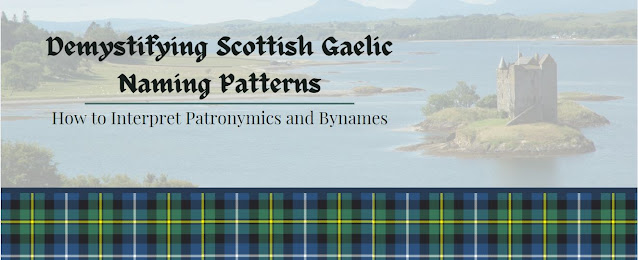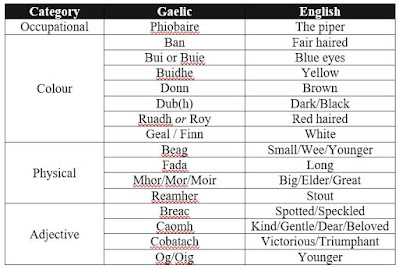Demystifying Scottish Gaelic Naming Patterns: How to Interpret Patronymics and Bynames
- Get link
- X
- Other Apps
When I first started my Scottish research I was caught off guard by the structure of the names. Some had long lists of names held in brackets after the first name, while others had reoccurring Gaelic words as a middle name of sorts. I have come to learn that these are referred to as patronymics and bynames respectively. This topic right here is one of the reasons I wanted to start this blog. It belongs to the lesser known parts of history - especially bynames. Researching this topic is difficult as few available sources of information have been indexed by Google. The ones that have, offer little more than a few sentences and maybe an example or two. I have compiled the information from these sources below.
Patronymics
Patronymics
are commonly used in families which use a naming tradition because they help to
differentiate two individuals which share the same name. More simply, a
patronymic is a list of names which descend the paternal generations of the
family. The names are placed in a bracket between the first and last name, as
seen below. After the first name the list of names descending generations on
the paternal side of the family are given. For example, if the father was named
John, grandfather James and great grandfather William, then the patronymic for the
son would be:
FIRST NAME
(John, James, William) LAST NAME
In Scotland, there are two different patronymic
methods which were commonly used for surnames. In the lowlands, the son’s
surname was derived by adding -SON to the end of the father’s name. For
example, the son of Robert would be RobertSON. In medieval times, the surname
changed every generation. With time, this tradition died out and the same
surname began to be passed down to each generation. In the highlands (and
Ireland), Mc-, Mac-, or Ma- are all variations meaning “son of” and were added
as a prefix to the father’s name. For example, the son of Donald would be given
the surname McDonald. In case of a man who joined a clan, his son would have
the prefix O’- added to the clan name. This prefix can also mean, “of the
generations of” or “grandson of”. For example, a man in Clan Donald who was not
a Donald himself could give his son the surname O’Donald.
Based on the naming patterns which existed in the
Highlands and Lowlands, each surname cannot be traced back to a single clan but
rather several individuals which shared the same given name. Clans with the
same name were often distinguished by their location.
Bynames
Bynames are descriptive terms which are placed after the first name to differentiate individuals in that share the same name. I have included a copy below of a table that I personally use when researching Scottish families that use this naming pattern. Over time I have encountered the following names or ones from the same category. Some of the Gaelic bynames have been generated using Google Translate while others are directly from my own ancestors. This table is by no means extensive but it covers many common bynames.
There are a few bynames that vary in spelling however they mean the same thing. It is good to be aware of this this when researching as it can save you a lot of time spent trying to track down the meaning behind a spelling variation.
- Get link
- X
- Other Apps





Comments
Post a Comment